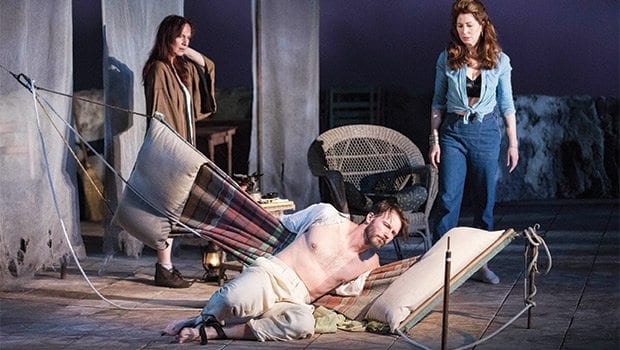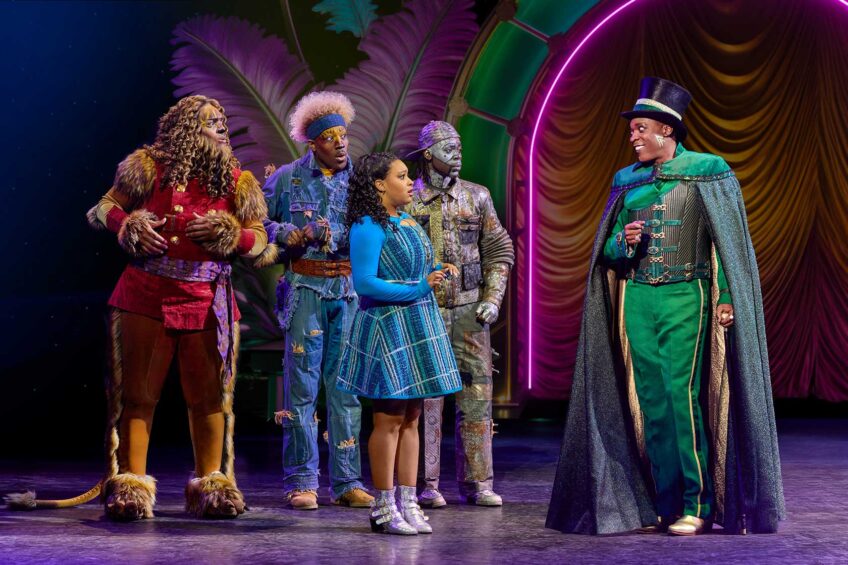American Rep’s star-studded cast ruminates on life, atonement in ‘Night of the Iguana’

Tennessee Williams’ “Night of the Iguana” hosts all the components of a successful joke. A raunchy widow, ex-preacher, con artist (literally) and blind man walk into a Mexican hotel. But the American Repertory Theater’s star-studded rendition — featuring Bill Heck, Amanda Plummer, Dana Delany, Elizabeth Ashley and James Earl Jones — is light on laughs and heavy on theatric power and existential dread.
On the web
For more on the ART production of “Night of the Iguana,” visit: https://ticket.americanrepertorytheater.org/single/PSDetail.aspx?psn=1141
The show follows Reverend T. Lawrence Shannon (Heck), an ex-preacher with a history of sexual misdemeanors and a lousy career as a low-end tour guide. He stops by the Mexican hotel of friend and recent widow Maxine Faulk (Delany), who’s desperate for his companionship. While he’s there he develops a close bond with a traveling, struggling artist and spinster Hannah Jelkes (Plummer) who is there on credit with her 97-year-old poet father Nonno (James Earl Jones).
“The development of the script is unique to this production,” says Heck. “We came into rehearsal and collectively put together a draft.”
Williams is famous for not finishing his plays, and though all of the words in the show are his, the cast assembled them to connect more powerfully with the contemporary world. The themes of searching for human connection and personal identity are evergreen, but Heck points to the inclusion of the Nazi family, also visiting the hotel, as a nod to the political climate.
Shannon’s life is haunted throughout the play by a “spook,” a symbol of fear, failure, and loss. He speaks often of repenting for his crimes by “swimming to China,” or effectively killing himself. Jelkes, who provides the voice of levity and reason in the play, scoffs at these ideas. “Isn’t that a kind of comfortable crucifixion,” she says. Isn’t dying the easy way out?
Jelkes provides a refreshing break from Williams’ tradition female mold. Though she maintains all of the grace and refinement of his Southern belles, this Nantucket spinster’s hallmark is her inner strength. Her fortitude and optimism in the face of misfortune were denied to Williams’ Blanche DuBois and Alma Winemiller. In one conversation with Shannon he asks her how she was able to beat her “spook.” She replies, “By showing that I could endure him.”
In keeping with Williams’ style, the heavy symbolism of the iguana, tied to the back porch and desperate to break free, weighs over the show. When Shannon finds the strength to free the iguana, and himself, it’s significantly less powerful than his scenes of struggle. What shapes Shannon, and all of us, isn’t the moment of overcoming a problem, but the road leading up to it. Heck says, “It’s an extraordinary battle about what it means to live in the world, in all of the world.”
This message about the underlying difficulty of life proves more salient than the emotional connection between Shannon and Jelkes, which is effective as a plot device but not especially moving. All the characters have had difficult paths and face loneliness and strife on the road ahead. There is no shortcut to making amends for past wrongs, not even in suicide. “Night of the Iguana” presents the scariest of all truths: that the most atonement, the most suffering, comes not from death, but from life.







